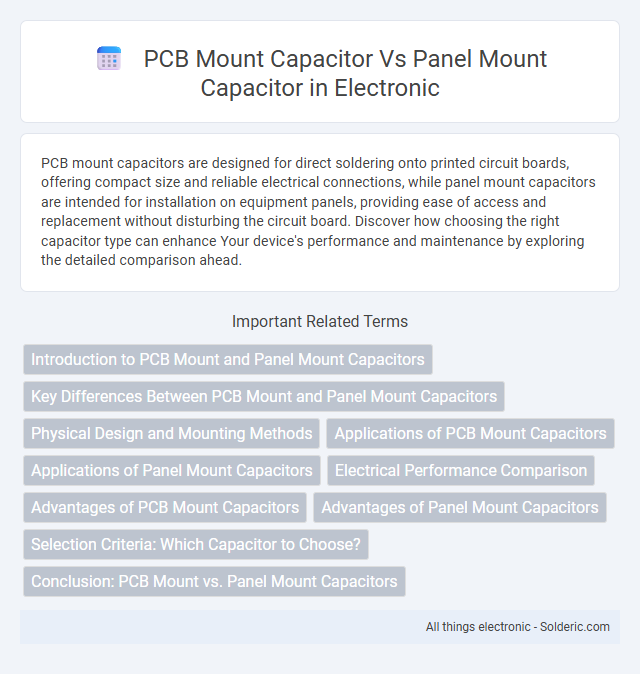PCB mount capacitors are designed for direct soldering onto printed circuit boards, offering compact size and reliable electrical connections, while panel mount capacitors are intended for installation on equipment panels, providing ease of access and replacement without disturbing the circuit board. Discover how choosing the right capacitor type can enhance Your device's performance and maintenance by exploring the detailed comparison ahead.
Comparison Table
| Feature | PCB Mount Capacitor | Panel Mount Capacitor |
|---|---|---|
| Mounting Type | Directly on PCB pads | Attached to a panel or enclosure |
| Size | Compact, suitable for dense circuits | Larger, designed for easy access and replacement |
| Application | Internal circuit filtering, timing, and decoupling | External filtering, power factor correction, and high voltage environments |
| Voltage Rating | Typically low to medium voltage | Medium to high voltage capabilities |
| Installation | Soldered to the PCB | Secured via screws or clips to the panel |
| Maintenance | Replacement requires PCB work | Easier replacement without PCB removal |
| Durability | Dependent on PCB environment | Robust, often designed for harsh environments |
Introduction to PCB Mount and Panel Mount Capacitors
PCB mount capacitors are designed for direct attachment onto printed circuit boards, enabling compact, automated assembly, and reliable electrical connections. Panel mount capacitors are intended for installation through holes or cutouts on equipment panels, facilitating easy access for maintenance or adjustments. Understanding your application requirements helps determine whether PCB mount or panel mount capacitors provide the optimal solution based on size, accessibility, and installation method.
Key Differences Between PCB Mount and Panel Mount Capacitors
PCB mount capacitors are designed to be soldered directly onto a printed circuit board, offering compact, low-profile installation essential for automated assembly and high-density electronic designs. Panel mount capacitors feature threaded bodies and terminals for secure mechanical attachment to panels or chassis, providing robust physical support and easy access for maintenance or replacement. The primary differences lie in mounting methodology, mechanical stability, and suitability for environments requiring frequent servicing or space-saving circuit integration.
Physical Design and Mounting Methods
PCB mount capacitors feature compact, flat bodies designed for direct soldering onto printed circuit boards, enabling automated assembly and space-efficient layouts. Panel mount capacitors, however, are built with larger, threaded or flange-style bodies for secure attachment through enclosures or panels, providing easy access for manual adjustments or replacements. Your choice depends on installation requirements, as PCB mounts optimize circuit density while panel mounts enhance durability and accessibility in control systems.
Applications of PCB Mount Capacitors
PCB mount capacitors are widely used in compact electronic devices, including smartphones, computers, and wearable technology, where space-saving and automated assembly are critical. They support high-frequency signal filtering, power supply stabilization, and noise reduction within densely packed circuit boards. Your electronic designs benefit from their efficient performance in applications requiring reliable, low-inductance, and surface-mount components.
Applications of Panel Mount Capacitors
Panel mount capacitors are designed for applications requiring easy access for adjustment or replacement, commonly found in power supplies, audio equipment, and industrial control panels. Their robust construction allows secure mounting on panels where vibration resistance and durability are critical. You benefit from their convenient installation and maintenance capabilities in environments demanding frequent tuning or monitoring.
Electrical Performance Comparison
PCB mount capacitors offer superior electrical performance with lower equivalent series resistance (ESR) and inductance due to their proximity to the circuit board, enabling faster response times and better high-frequency characteristics. Panel mount capacitors, while easier to replace and often built for higher voltage or current ratings, typically exhibit higher parasitic inductance and ESR, reducing efficiency in high-speed or high-frequency applications. Selecting between the two depends on the specific electrical requirements, including frequency response, stability, and power handling capabilities.
Advantages of PCB Mount Capacitors
PCB mount capacitors offer superior compactness and ease of automated assembly compared to panel mount capacitors, enhancing manufacturing efficiency. Their low-profile design enables space-saving on densely populated circuit boards, essential for modern electronics. Additionally, PCB mount capacitors provide improved electrical performance due to shorter lead lengths, reducing parasitic inductance and resistance.
Advantages of Panel Mount Capacitors
Panel mount capacitors offer superior heat dissipation and enhanced mechanical stability compared to PCB mount capacitors, reducing the risk of damage in high-vibration environments. Their larger size allows for higher capacitance values and voltage ratings, making them suitable for power electronics and industrial applications. Easy accessibility for maintenance and replacement improves overall system reliability and reduces downtime.
Selection Criteria: Which Capacitor to Choose?
PCB mount capacitors offer compact size and efficient placement for high-density circuits, making them ideal for applications requiring automated assembly and reliable electrical performance. Panel mount capacitors provide easy access and convenient replacement, suited for devices requiring frequent maintenance or adjustment in harsh environments. Selection depends on factors like space constraints, environmental conditions, and maintenance needs, with PCB mount preferred for circuit integration and panel mount for user accessibility.
Conclusion: PCB Mount vs. Panel Mount Capacitors
PCB mount capacitors offer compact size and automated assembly advantages ideal for densely populated electronic circuits, enhancing manufacturing efficiency and reducing costs. Panel mount capacitors provide easy access for adjustment or replacement in control panels, making them suitable for applications requiring manual interaction or high durability in harsh environments. Your choice between PCB mount and panel mount capacitors depends on the design priorities of space optimization and automated production versus serviceability and ruggedness.
PCB mount capacitor vs panel mount capacitor Infographic

 solderic.com
solderic.com